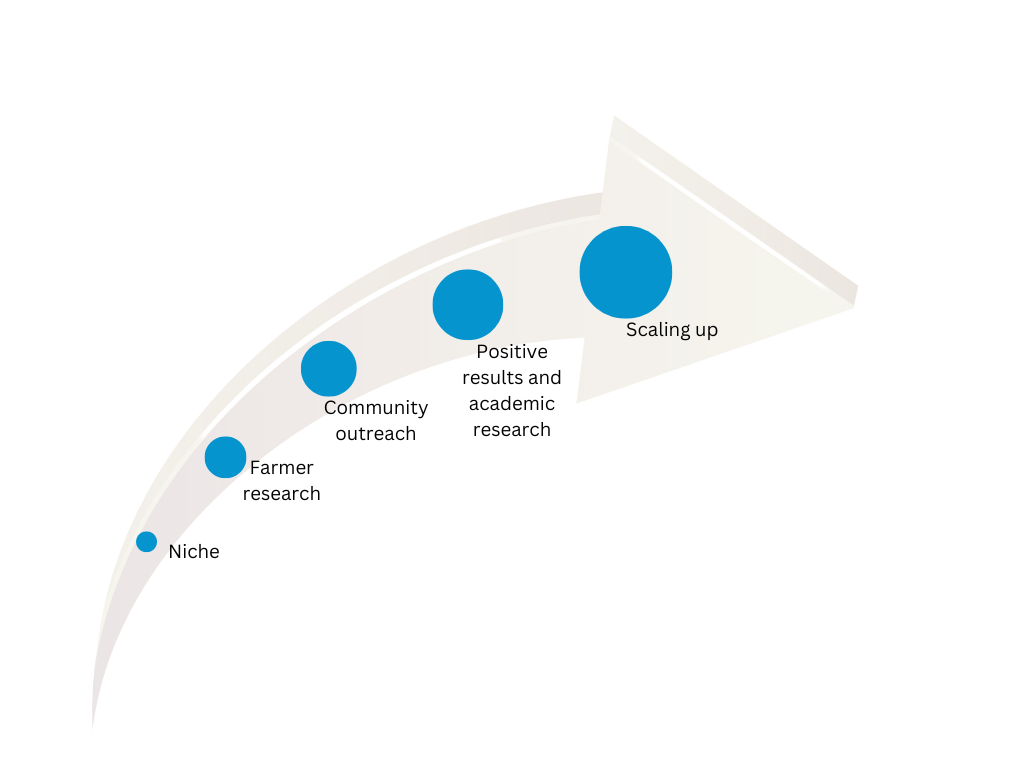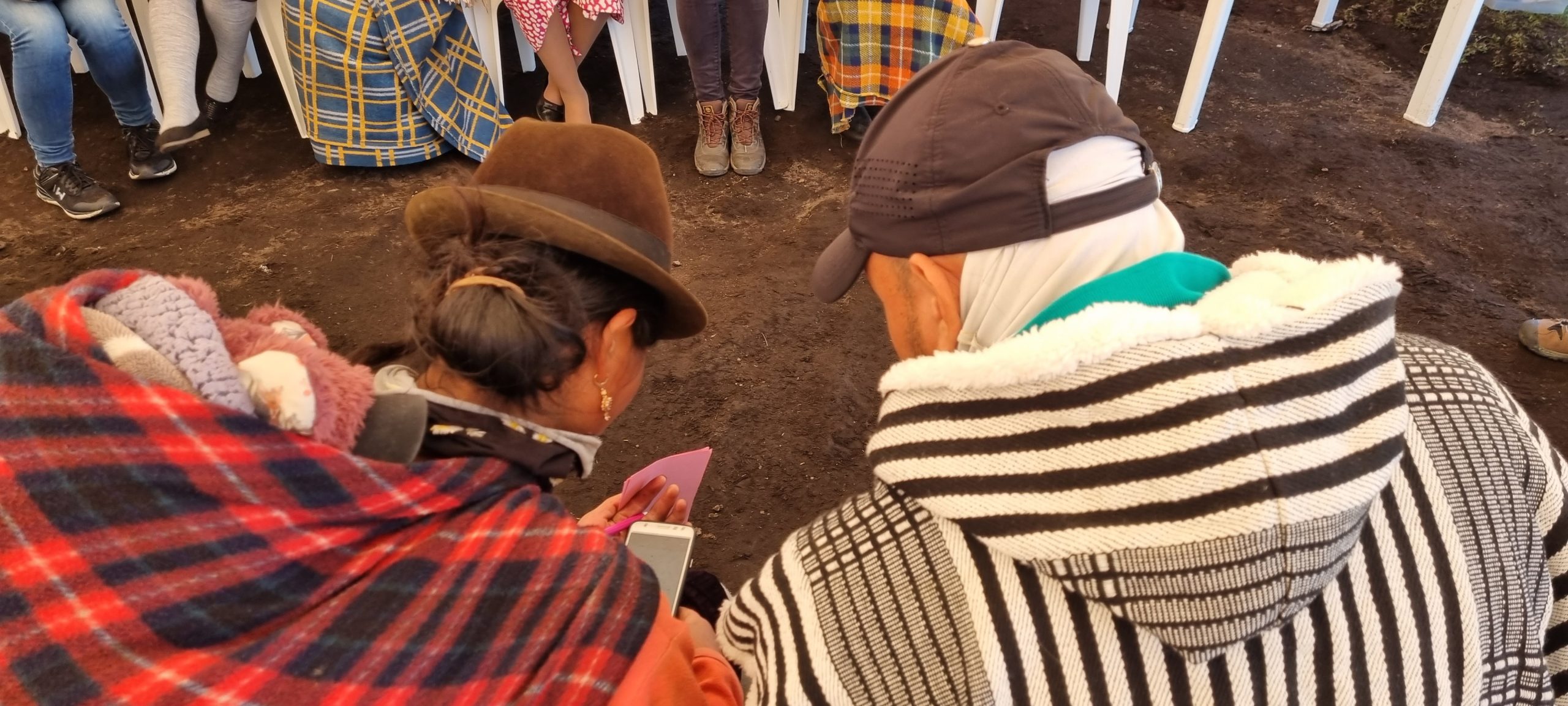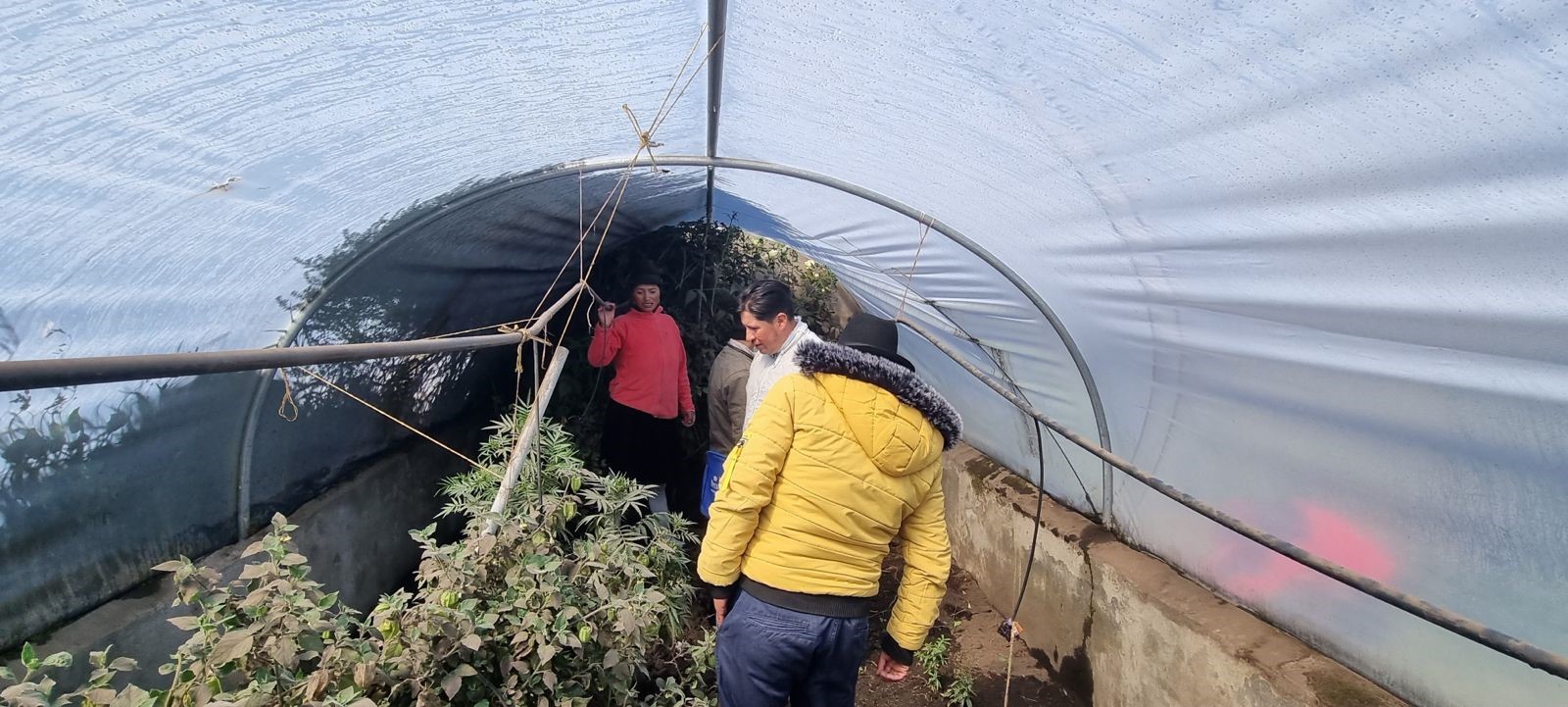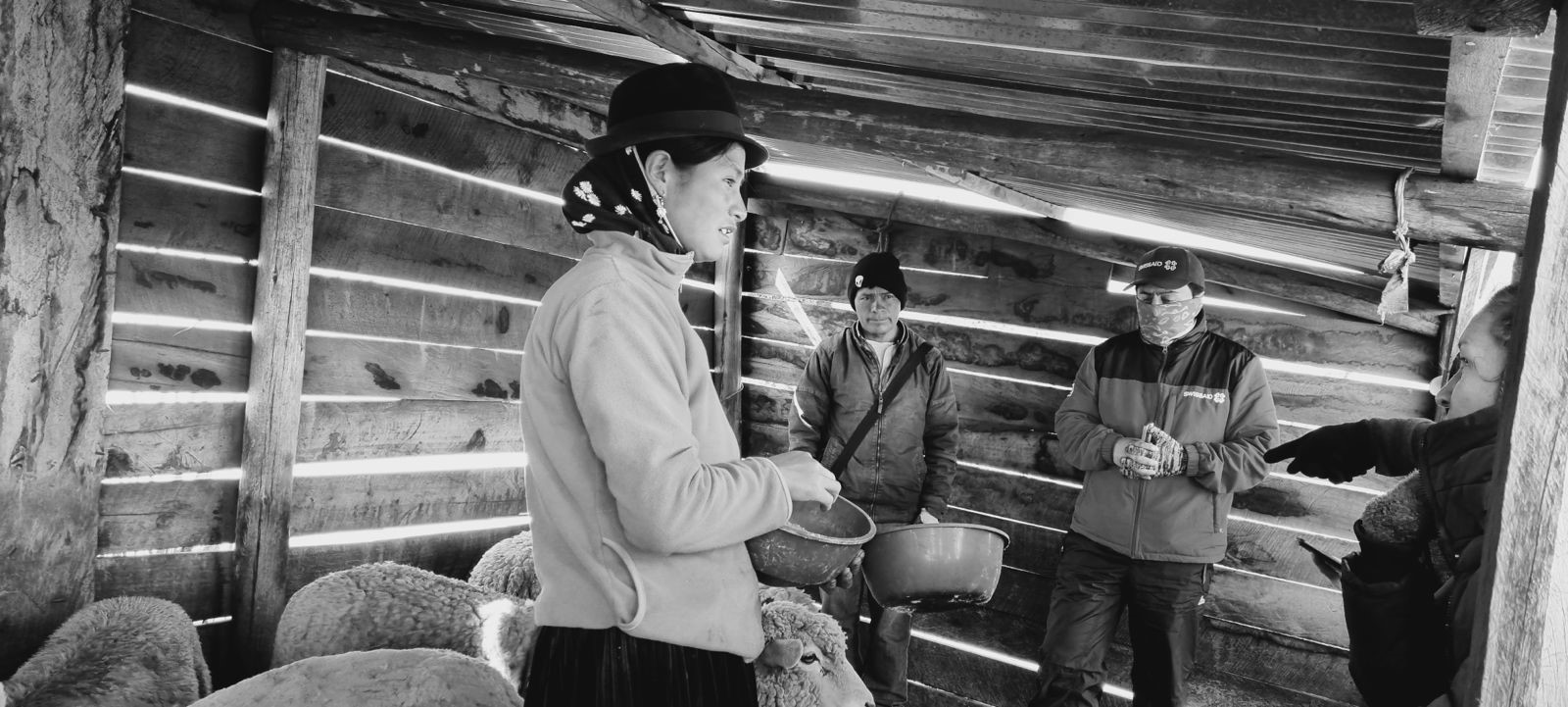The Agroecological Adaptation Laboratories (AeD-LABs) project
Nicaragua, Colombia, Ecuador
The AeD-LABs project intends to support digital peer to peer knowledge exchange on climate change adaptation and strengthen farmers’ adaptive capacities through agroecological innovation in the face of climate change.
Lead organizations
The project led by SWISSAID Colombia, SWISSAID Ecuador and SWISSAID Nicaragua has several local partners, including RENAF-Red Nacional de Agricultura campesina, familiar y comunitaria, Semillas de Identidad in Colombia, the Unión Nacional de Agricultores y Ganaderos (UNAG), the Organización para el Desarrollo Económico y Social para el Área Urbana y Rural (ODESAR) in Nicaragua, and the Redes de Mujeres in Ecuador. Main international partners are Farmbetter –a private sector ICT solutions actor – and the World Overview of Conservation Approaches and Technologies (WOCAT).
Countries
Nicaragua, Colombia and Ecuador
Timeline
September 2022-2026
Funding
USD 500,000, funded by several family foundations such as the Swiss-based Stiftung Volkart and the Stiftung Dreiklang.
Mission
The AeD-LABs project strengthens farmers’ adaptive capacities through support to agroecological farmer-led innovation processes in the face of climate change. To do so, facilitators and communities carefully collected local agroecological innovations among small family farmers and small food system actors to then share them to strengthen these actors’ resilience against climate change. The innovations are now featured in an easily accessible virtual space, functioning via application and WhatsApp chatbot. At the same time, innovation processes and farmer-led research are encouraged and supported in the communities beyond the digital space. Successful scaling of the innovations builds on the participation of more and more smallholder farmers and their organizations as well as researchers and extension services. Ultimately, critical financial support by donors is also needed. Careful data analysis aliments the broader dialogue about how to reduce political or financial barriers to the implementation of agroecological solutions to climate change adaptation.
Context
These countries share similar landscapes and face analogous difficulties due to climate change in their ecosystems: Ecuador and Colombia share the Páramo mountain range (moorland) and several forest ecosystems (rainforest) while the dry corridor in Nicaragua shares aspects of its ecosystem with the tropical dry forest in Colombia. The challenges faced in these critical ecosystems are drought, heat, strong winds, and heavy, unpredictable rains, as well as frost at high altitudes. These events affect the local agriculture, food systems and community livelihoods. Some of the aforementioned ecosystems are biodiversity hotspots. All of them provide additional critical ecosystem services such as regulating the hydrological cycle and providing water to the megacities in the plains, creating microclimates, and storing carbon in soil and vegetation. Nonetheless, these ecosystems are threatened by climate change and harmful practices, such as mining and conventional agriculture. Agroecology supports families living in these ecosystems and protects and supports these systems and their services.
Main beneficiaries
Local farmers and research organizations. Ultimately the project aims to reach 6,000 indirect beneficiaries and beyond (including 1,450 direct ones).
Strategy
Objectives
- Make farmer innovation for climate change adaptation visible and accessible to others and create spaces where they conduct trials, exchange knowledge and showcase their research results and innovations for climate change adaptation (Agroecological Adaptation LABs).
- Provide instruments for the exchange of innovations between communities who face difficulties in similar ecosystems, including through the farmbetter mobile extension app and WhatsApp.
- Strengthen farmer-led research to strengthen early-stage innovations through farmer led research designs, experimentation, relevant capacity-building and collaboration with researchers.
- Scale-up innovation in fostering the recognition of innovations and inventors. Put the innovations into practice through collaboration with farmers’ organizations, extension services, policy-makers and investors or donors.
Type/size of farms and type of food products: family farms, size around 1-5 ha; used to produce mainly potatoes, maize (corn), beans, vegetables and currently also produce products based on medicinal plants, cattle and small livestock.
Activities
Featured principles and elements: Co-creation of knowledge and connectivity
- Conducting a survey among 110 participants in the 3 countries in 2023
- Assessing survey results:
- Main climatic issues for agriculture according to survey participants were water scarcity, drought, winds and degraded soils.
- Main solutions identified were planting (agroforestry, reforestation, crop diversification and native species), seed banks to protect native seeds, and water management practices (managing water infiltration, setting up reservoirs, supply, organic composts, etc.).
- Defining innovation as farmers:
- Innovation is the “process of creating a new product, production process, service or management model that solves a specific problem” IICA, 2023.
- Innovation is a newly introduced process, product or service.
- Innovation is a process, product or service from another place, or which is rediscovered/preserved, or that helps to adapt.
- Innovation is not always intentional – it can arise by chance or be discovered inadvertently. It is verified by research, it addresses climate-related issues, and it sparks processes of dialogue and exchange.
- Outline the process for bringing innovations to maturity. An innovation starts off being implemented by a niche group, and SWISSAID then supports farmers through agroecological labs so that they can undertake farmer-led research, trialling the innovation and deciding whether it should be shared further or not. Farmers then reach out to the community to encourage them to implement the innovation. During this phase, it is important to get academics and researchers on board and do more joint research elsewhere with other farmers. Once the innovation shows positive, scientifically backed results in clearly described, different contexts, it can be scaled up in other ecosystems with similar problems.

- Identifying the first sets of innovations:
- Greenhouses to control temperatures
- Newly discovered crops to enhance soil fertility
- Rescue native seeds via seed banks
- Temperature and rainfall monitoring to help people make better decisions about when and where to plant which crops
- Agroforestry systems to help soil recovery and other ecosystem services
- Nutritional supplements for animals, to strengthen them and have a better production
- Collaborating with partners from the outset, including farmer organisations, governmental and extension services, and research organisations.
- Organising in-person workshops to foster farmer-led research.
- Developing didactical material on climate change risks and options for action (leaflets, the application, videos, radio, and so on)
- Co-developing the Farmbetter extension application to suit farmers’ needs and enable innovation and knowledge exchanges via Whatsapp. The app has four key functions:
- Communication with the facilitator/extension agent (or a lead farmer) via WhatsApp for those who have a problem to solve
- Upload farmers’ innovations into the application to share with others
- Control panel for quality assurance regarding the innovations
- Database and library for those who want to browse WOCAT good practices on sustainable land management and climate change adaptation
- Forum / webpage (coming soon) to facilitate communication with the wider community of researchers, policymakers, and donors or investors.
Pictures:
1. Sharing experiences -Colombia. Guangaje, May 2023.
2.Sharing the experience of adding homemade mineral salts to sheep feed.
3. The greenhouse is a mixed concrete and plastic cover construction for the production of vegetable seedlings and is also being used to produce some fruit trees that, due to climatic conditions, do not grow in the open field.
Credits: Courtesy Daniele Conversa, farmbetter.
Monitoring and Evaluation Methods
- Quantitative: information on the direct and indirect beneficiaries of a project, as well as the total number of innovations uploaded and downloaded, are retained by the application.
- Qualitative objectives are monitored by extension agents/facilitators through different workshops (e.g. quality and satisfaction with the farmer-led research process).
Outcomes and Lessons Learned
Outcomes
- Progress so far: 40 innovations to be uploaded by the end of 2024. Additional innovations have been researched, and are expected to be ready by the end of 2026.
- Farmers are very interested in researching their innovations further and sharing them via app.
- The project invests in creating easily understandable content on the one hand, and improving the digital literacy of communities on the other.
- Partners such as farmers’ organisations, NGOs and extension services generally welcome more efficient communication with smallholder families, including on climate change adaptation.
- Longer follow-up time is required to see the long-term effects of innovations on climate change mitigation and adaptation.
Lessons learned
- A financial mechanism which compensates farmers when an experiment goes wrong helps to maintain farmers’ willingness to invest in innovation.
- Identifying innovations and researching them more systematically requires prior co-creation processes within the communities and with research organisations willing to engage in farmer-led research.
- Lead farmers and/or extension agents are key in the set up to making knowledge exchange work. By sharing didactical WOCAT solutions via app and WhatsApp, as well as technical inputs regarding farmers’ innovations, they can help farmers work on both innovations and problems efficiently. However, this requires a careful selection of any new members of the lead farmer/extension agents’ group and may make scaling slower.
- To ensure its long-term sustainability, the project and app should ultimately be jointly taken over by communities, extensionists and research partners.
Limiting Factors
- Connectivity issues in remote locations complicate the project’s outreach via app and WhatsApp. We are currently considering investing in offline technology.
- Financial means are key for the farmers to be able to respond to losses and damage due to climate change and to apply the developed solutions at a larger scale in order to prevent future losses and damages.
- Horizontal co-creation of knowledge processes between researchers/academia and farmer-researchers will help to change the paradigms of conventional research and implement effective participatory action research processes that recognise the local knowledge of communities.
Contact
Yeny Carillo, SWISSAID, y.carrillo@swissaidcolombia.org
Sonja Tschirren, SWISSAID, s.tschirren@swissaid.ch



